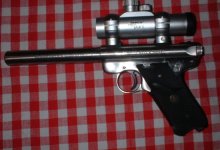Magnum Wheel Man
New member
Hmmm... never...
well... this isn't a rifle, but I shot so many rounds through it in one day, that a bullet got stuck in the barrel ( no, not a squib load, the barrel was so leaded, that a round stuck in the gun )... 1200 rounds of cheap Remington Thunder Bolt ammo, in about 7 hours of active range shooting ( we were shooting competitive spinners betwen 3-4 of us )
I had to take it to my gun building buddy to get the bullet removed, & the extremely heavy lead fowling removed...
I now only use copper washed bullets, & never Remington thunder bolt ammo...
so from my expirience, cleaning should depend the quality of ammo, & the amount & frequency of rounds shot...
... I believe in the old saying...

My friend Dr.Lee told me once to never clean a .22 rifle. The fouling on the bore isnt great enough. The net round blows it all out. (with the exception of coated rounds) You do more harm risking the crowning and hurting the barrel than you do leaving it be!
well... this isn't a rifle, but I shot so many rounds through it in one day, that a bullet got stuck in the barrel ( no, not a squib load, the barrel was so leaded, that a round stuck in the gun )... 1200 rounds of cheap Remington Thunder Bolt ammo, in about 7 hours of active range shooting ( we were shooting competitive spinners betwen 3-4 of us )
I had to take it to my gun building buddy to get the bullet removed, & the extremely heavy lead fowling removed...
I now only use copper washed bullets, & never Remington thunder bolt ammo...
so from my expirience, cleaning should depend the quality of ammo, & the amount & frequency of rounds shot...
... I believe in the old saying...
Never say never... & never say always...
Attachments
Last edited:

